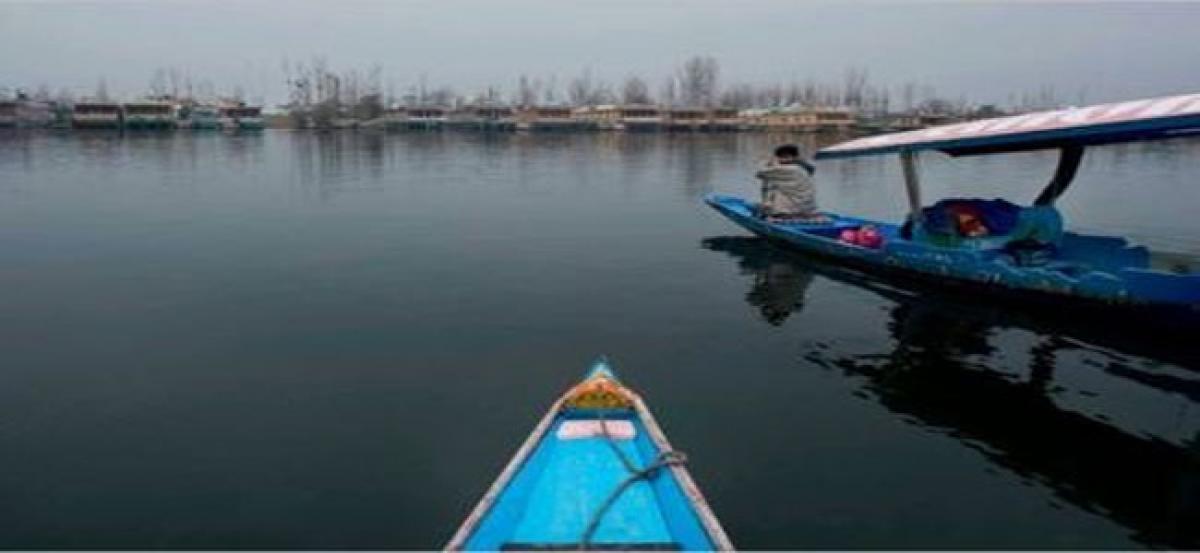Live
- Rammurthy Naidu's Last Rites Held in Naravari Palli
- PM Modi receives ceremonial welcome in Abuja, begins bilateral talks with Nigerian President Tinubu
- Goods traffic doubles on the new railway freight corridors
- BGT 2024-25: I’d like to see him make one more Test ton in Australia, says Johnso
- Harassment due to ED raids forced Kailash Gehlot to quit, hints Kejriwal
- Kailash Gehlot exit: BJP goes on the offensive against 'corrupt' AAP govt
- PM Modi pays homage to ‘the great’ Balasaheb Thackeray on his death anniversary
- One who cares for Delhi will not stay with gang of robbers: Sachdeva on Gahlot's resignation
- From Self-Doubt to Self-Love: Vange Cain’s Inspirational Path
- Rahul Gandhi remembers Balasaheb Thackeray on his death anniversary
Just In

With electricity supply erratic this winter, kangri — the traditional earthen firepot woven in wicker — has emerged as an useful means to fight subzero temperatures in Kashmir.
SRINAGAR: With electricity supply erratic this winter, kangri — the traditional earthen firepot woven in wicker — has emerged as an useful means to fight subzero temperatures in Kashmir.
Sales of kangri have almost doubled this winter compared to last year, people associated with this trade claimed and attributed it mainly to the erratic power supply.
The capping of subsidised LPG cylinders per household over the years and soaring prices of wood were listed as other factors that have forced the people to revert to use of kangris to keep themselves warm during winter.
"The sale of kangris was dipping every year over the past decade or so due to introduction of modern gadgets like heaters that used electricity, kerosene or LPG as fuel. However, as these fuels are not available readily now, people have started buying kangris again," Ghulam Mohammad, a resident of Charar-e-Sharief who sells kangris for a living, told PTI.
Many areas of Kashmir, including Srinagar, face electricity outages ranging between six and 12 hours every day while only 12 subsidised LPG cylinders are provided to each household every year.
Kerosene, which was widely used to fuel the heaters, has also become a rarity with each household getting only two litres per month at subsidised rates.Mohammad said this has led to a spur in sales of kangris.
"I used to sell 10 to 15 kangris every day at the start of the winter season, which was definitely not enough to make a proper living. However, the sales this year improved and I sell anywhere between 20 and 25 kangris each day."
An average kangri costs between Rs 150 and Rs 200 but the price of a good quality firepot ranges from Rs 300 to Rs 500.
The 65-year-old artisan spends summer buying the raw material for kangris and makes them during autumn months so that his merchandise is ready for sale at the onset of winter.
The increase in sale has rekindled his hope that the art of making kangri, unique to Kashmir, can be preserved and passed to the next generation.
"The low returns earlier were major deterrent for the younger generation to even consider entering this trade but there is hope now. A good craftsman can make more money than an entry level government employee does under the new job policy of the state government," Mohammad Abid, 30-year-old son of Ghulam Mohammad, said.
The exact size of market for kangri in Kashmir is difficult to gauge but thousands of people get their livelihood from being associated with its trade.Besides being used to fight winter chill, kangri, an earthen pot woven around with wicker filled with hot embers, is also regarded as a work of art.
Abdul Hamid, a shopkeeper in outskirts of Srinagar dealing only with wicker products including kangri, felt the pot is here to stay."With electricity meters being installed everywhere, people from economically weaker sections — may be even middle class — will have to rely on kangris to keep themselves warm," Hamid said.
He said the Kangri had a special place in the Kashmiri culture which extends beyond the valley now.
"We also have decorative kangris which cost upwards of Rs 1,500 to Rs 3,000. These are normally given as gifts and adorn many a drawing room in Kashmir and outside the valley. Brides would be gifted at least one such kangri by her parents at the time of marriage... such was the importance of kangri in Kashmiri culture," he added.

© 2024 Hyderabad Media House Limited/The Hans India. All rights reserved. Powered by hocalwire.com







